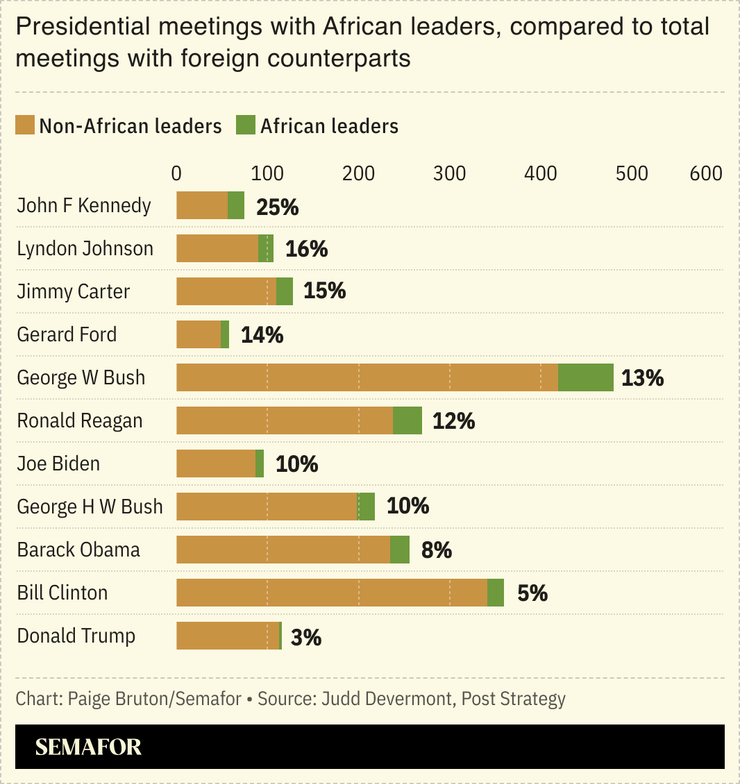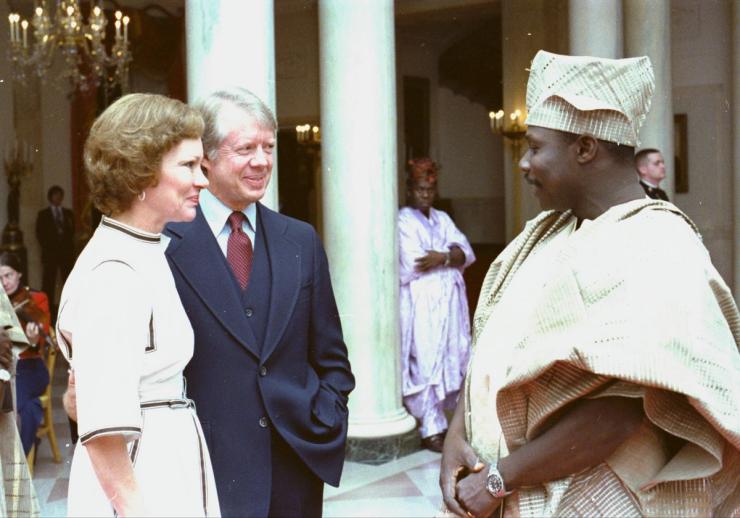Presidential engagement is the indispensable factor in an effective US-Africa policy. American presidents who meet with more African leaders, on balance, launch more initiatives, introduce more policies, and engage more Africans on global issues. So, if you want to judge a US president’s record, you need to track the number of Oval Office meetings with African leaders.
With help from Bobby Pittman, who served as President George W. Bush’s Senior Director for African Affairs at the National Security Council from 2006 to 2009, I went through every US presidential meeting with African and non-African leaders at the White House from January 1961 to January 2025.
The results were both unsurprising and surprising. As expected, President George W. Bush topped the chart. He spent more time with African leaders than any other president. By our count, he spent 3% of his working days in meetings with African leaders, which roughly translates to hosting an African counterpart every 33 days. He prioritized Africa in his signature initiatives, including the President’s Emergency Program for AIDS Relief (PEPFAR). By the time Bush announced PEPFAR in his State of the Union speech in January 2003, he had already hosted 14 African leaders at the White House — more than Trump and Biden combined.

President John F. Kennedy also performed extraordinarily well. Not only did he spend 2.6% of his total working days with African leaders, he met with more African counterparts as a percentage of his foreign leader engagements than any other American president. According to our research, Kennedy’s Africa meetings represented a quarter of all foreign leader encounters during his administration. Kennedy’s commitment to personal engagement with Africans translated into major US policy outcomes, including the establishment of the Peace Corp and US Agency for International Development. And, at least in part due to his personal ties, he persuaded the Guineans, Ghanaians, and Senegalese to deny landing rights to Havana-bound Soviet aircraft during the Cuban Missile Crisis.
However, what is striking about our results is how it changes our understanding of which presidents were more involved in Africa. Contrary to conventional wisdom, every Cold War-era president spent more time with African counterparts than their post-Cold War successors, save for George W. Bush. Our data flips the whole historical narrative of neglect during the Cold War and attention in the post-9/11 era.
While Presidents Lyndon Johnson, Richard Nixon, Gerald Ford, Ronald Reagan, Jimmy Carter, and George H.W. Bush spent between 1% and 2% of their working days with African counterparts, Presidents Bill Clinton, Barack Obama, Donald Trump, and Joe Biden only dedicated 1% or less to Africa. Trump had the lowest score of all US presidents; he hosted Kenyan President Uhuru Kenyatta twice and met Nigerian President Muhammadu Buhari once.
Based on our findings, it is evident that unless a president engages — frequently and with a diverse group of the region’s leaders — it is near impossible to significantly and profoundly advance US interests. If you don’t believe it, just look at the data.
*An extended version of this piece first published in Devermont’s Post Strategy newsletter:
Judd Devermont is an operating partner at Kupanda Capital and senior advisor (non-resident) at the Center for Strategic and International Studies. He was Special Assistant to the President and National Security Council Senior Director for African Affairs under President Biden, as well as National Intelligence Officer for Africa under Presidents Trump and Obama.

